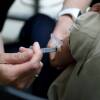Abdulla Aldhaheri is a freshman at Brown University, but he’s never actually been to the hilltop campus in Providence, R.I. The pandemic meant he started college remotely, from his home in the United Arab Emirates.
“I really want to come to campus, I feel disconnected,” Aldhaheri said.
Aldhaheri — like other international students — is navigating a whole host of issues in order to make it to campus. One is the requirement at many U.S. colleges that students be vaccinated. For Aldhaheri and the roughly one million international students who study in the United States annually, this is not necessarily a clear-cut directive.
When Aldhaheri learned about Brown’s vaccine requirement, he only had access to a vaccine from China. “I was nervous. Should I take the vaccine? Should I wait a bit?” he recalled thinking.
As his parents and siblings got the shot, Aldhaheri decided not to since it wasn’t clear to him if Brown would accept a vaccine that wasn’t authorized in the United States. Aldhaheri was later able to get the Pfizer vaccine, but his initial questions were valid.
Each school is deciding for itself what to do with vaccinations for international students, which has led to a patchwork of rules and requirements.
Some schools — like Tufts and Boston University — are saying that all vaccines satisfy their requirement, including those coming out of Russia, China and Cuba. They point to promising data on the vaccines from around the world.
But other schools, including Northeastern, Harvard and Aldhaheri’s Brown University, are taking a different approach. These schools say that only a vaccine authorized by the Food and Drug Administration or World Health Organization will satisfy their requirement. These schools will then offer the students "re-vaccinations" with one of the three FDA-blessed vaccines. But exactly what will happen to international students who do not want another vaccine, or even in the interim before they can get an approved vaccine, varies.
At Northeastern, for example,
their policy is
At Brown, following a quarantine period mandated by Rhode Island for new arrivals, these students will be required to wear masks when indoors with others and outdoors if they are unable to maintain three feet of social distance.
Vanessa Britto, Brown’s executive director of Health and Wellness, says the message they are sending to international student is “get access to whatever vaccine you can, wherever you are, whenever you can. And when you arrive here — at Brown — we will work with you to offer you re-vaccination if you’ve not been able to access a vaccine that is FDA- or WHO-approved.”
Brown’s policy on re-vaccinations is following recommendations put out by the Centers for Disease Control and Prevention, or CDC.
“At one point, we weren’t really sure what we would do about some of the other vaccines that were being offered around the world, and so we were really grateful to get the guidance of the CDC,” said Britto.
While the CDC put out guidelines, it acknowledged in a statement to GBH News that “no data are available on the safety or efficacy of receiving a COVID-19 vaccine currently authorized in the United States after receipt of a non-FDA-authorized COVID-19 vaccine.” The
CDC recommends
The lack of definitive clinical trials has led to a debate about whether it is ethical for universities to ask students to inject something potentially unnecessary into their arms.
“We don't want to force college students coming in from abroad to our universities to be the guinea pigs for those trials,” said Michael Mina of Harvard’s School of Public Health.
He said if enough other people on campus are vaccinated — including almost all the American students — then it shouldn’t be a big concern if a small number of students have a potentially less effective vaccine.
But immunologist David Leib of Dartmouth College arrived at a different conclusion.
He pointed out that there’s no immunological reason to believe getting two different vaccines is dangerous. He said the very earliest studies of mixing and matching vaccines are
beginning to come out
“It doesn’t seem that re-vaccination with any of the vaccines that are available has any adverse effects and only seems to have beneficial effects,” Leib said. “So, I would probably land on the side of: Yes, it wouldn’t be a bad thing to get re-vaccinated.”
Regardless of whether students have more than one type of vaccine, experts say there’s another big concern looming: more worrisome COVID-19 variants. These experts say schools need to be planning for potentially worrisome new strains that can dodge all the vaccines, regardless of their country of origin.







